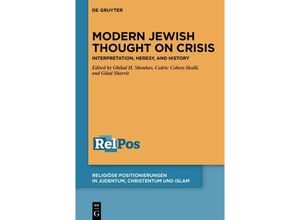This volume brings together scholars from a range of disciplines to explore the intersections
between crisis scholarship and action. The aim of this book is to think about the moment of
crisis through the concepts writings and methodologies awarded to us by Jewish thinkers in
modernity. This book offers a broad gallery of accounts on the notion of crisis in Jewish
modernity while emphasizing three terms: interpretation heresy and messianism. The main
thesis of the volume is that the diasporic and exilic experience of the Jewish people turned
their philosophers and theologians into experts in crisis management who had to find resources
within their own religion culture and traditions in order to react endure and overcome short-
and long-term historical crises. The underlining assumption of this book is therefore that
Jewish thought obtains resources for conceptualizing and reacting to the current forms of
crisis in the global European and Israeli spheres. The volume addresses a large readership in
humanities social and political sciences and religious studies taking as its assumption that
scholars in modern Jewish thought have an extended responsibility to engage in contemporary
debates.



